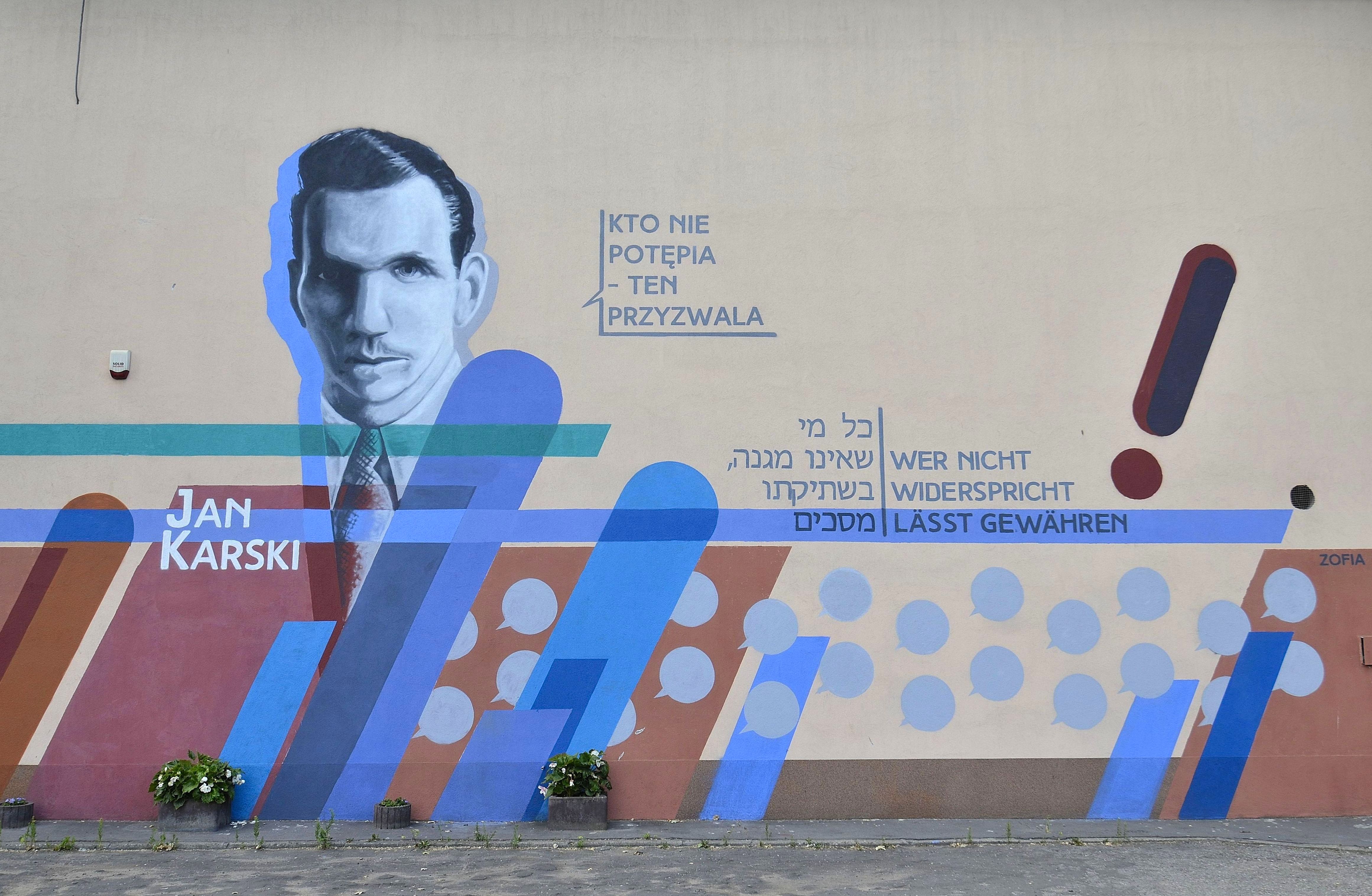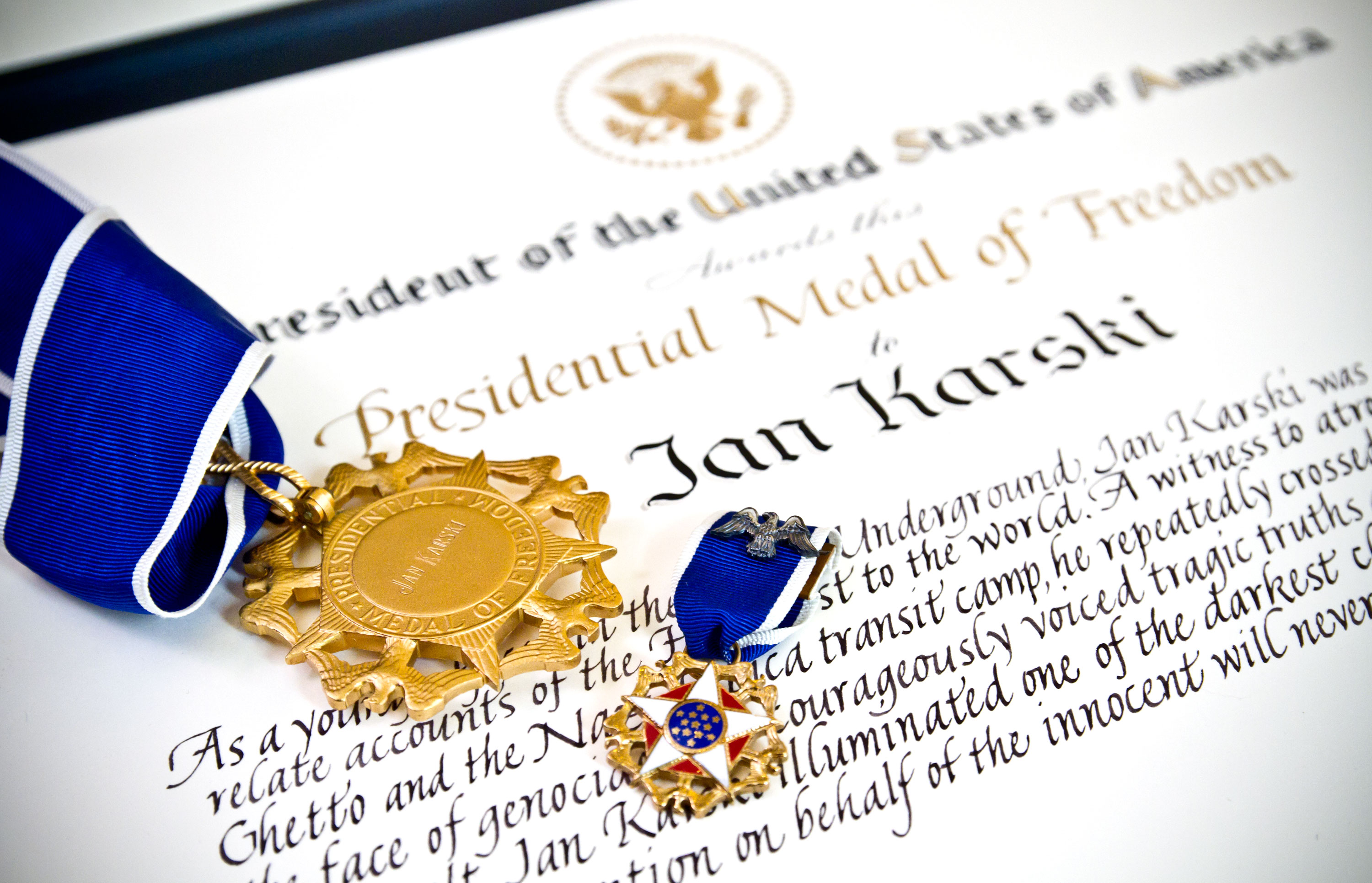WWII Polish Freedom Fighter
"The man who tried to stop the holocaust"
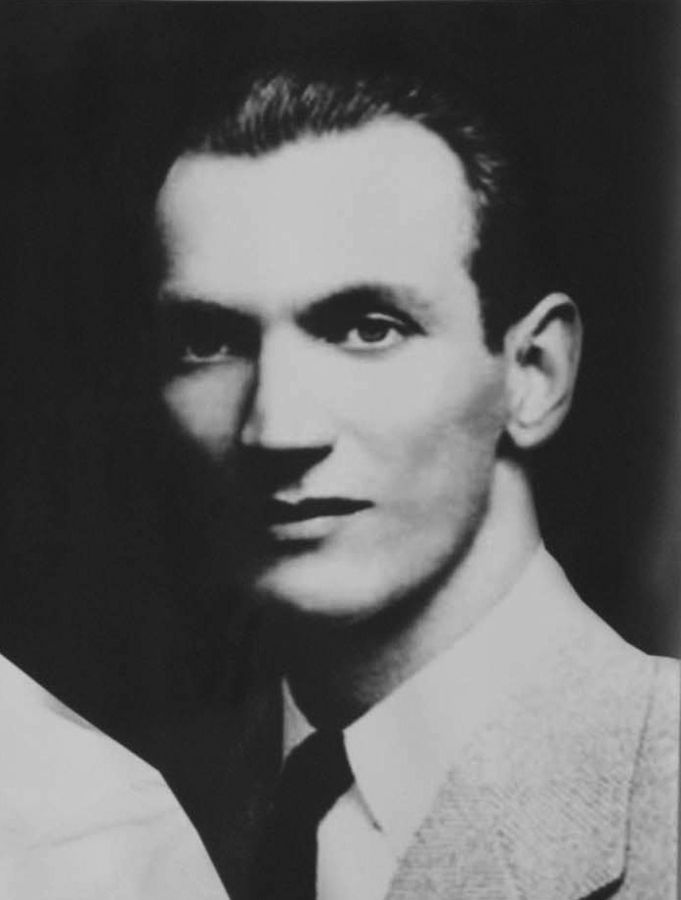 Jan Karski (24 June 1914 – 13 July 2000) was a Polish World War II resistance movement fighter and later professor at Georgetown University. In 1942 and 1943 Karski reported to the Polish government in exile and the Western Allies on the situation in German-occupied Poland, especially the destruction of the Warsaw Ghetto, and the secretive German-Nazi extermination camps.
Jan Karski (24 June 1914 – 13 July 2000) was a Polish World War II resistance movement fighter and later professor at Georgetown University. In 1942 and 1943 Karski reported to the Polish government in exile and the Western Allies on the situation in German-occupied Poland, especially the destruction of the Warsaw Ghetto, and the secretive German-Nazi extermination camps.
Early life
Jan Karski was born Jan Kozielewski on 24 June 1914 in Lódz, Poland, as recognized by the Karski family's lawyer, Dr. Wieslawa Kozielewska-Trzaska, Karski's niece and goddaughter, as well as by the Jan Karski Society, an organization established shortly after his death to preserve his legacy. The same date was used by Karski on some existing pre-war hand-written documents, including several in his diplomatic dossier at the League of Nations.

Jan Kozielewski's handwritten pre-WWII document showing birthdate from Lviv archives.
Jan Karski was named "Jan" [Polish for John] having been born on St John's Day, following the Polish pre-war custom of naming newborn infants after saints. An error was made in the baptismal records of 8 August, as Karski explained later in interviews on several occasions (see Waldemar Piasecki's biography of Karski: One Life, published in Poland) as well as published interviews with his family.
Karski's date of birth is sometimes given as 24 April 1914, based on his baptismal records in Russian and subsequently figuring on his official birth certificate. The Diploma for his master's degree (awarded in 1935) and the Certificate from the Artillery Reserve Officer Cadet School (awarded in 1936) both reflect his 24 April birthday. This is why some Karski tribute organizations also recognize the date as 24 April, as does the Google Cultural Institute's documentation, Museum of Polish History and the Museum of the City of Lódz, to which Karski left his papers, awards and artwork. The United States Senate withdrew 24 April as Jan Karski day from the final passed resolution in the Congressional Record, according to Polish Press Agency, citing Ms. Urbanska who lobbied for the day. Their colleagues at the Polish Senate did the same, according to the office of Bogdan Borusewicz. Some documents handwritten by Jan Karski before WWII list 24 June date, most importantly his official handwritten resume. All US documents list 11 April, including passport and social security card. Polish PWN Encyclopedia recognizes the date as 22 April. Another variant is on his diplomatic passport which lists his birthday as 22 March 1912. The error reflected in his war-time documents probably served Karski well in his profession.
Karski was raised a Catholic and remained so throughout his life. He grew up in a multi-cultural neighborhood where the majority of the population was then Jewish.
After intensive military training in the prestigious school for mounted artillery officers in Wlodzimierz Wolynski, he graduated with a First in the Class of 1936 and ordered to the 5th Regiment of Mounted Artillery, the same military unit where Colonel Józef Beck, Poland's Foreign Affairs Minister, served. He completed his diplomatic education between 1935 and 1938 in various posts in Romania (twice), Germany, Switzerland and the United Kingdom, and went on to join the Diplomatic Service. After completing and gaining a First in Grand Diplomatic Practice, on 1 January 1939 he started work in the Polish Ministry of Foreign Affairs.
World War II
During the Polish September Campaign, Kozielewski's 5th Regiment was a unit of the Kraków Cavalry Brigade, under General Zygmunt Piasecki and a part of Armia Kraków defending the area between Zabkowice and Czestochowa. After the last Battle of Tomaszów Lubelski on 10 September 1939, some units including 1st Battery of 5th Regiment with Kozielewski tried to reach Hungary but were captured by the Red Army between 17 and 20 September. Kozielewski was held prisoner in Kozielszczyna camp (presently Ukraine). He successfully concealed his true rank of 2nd Lieutenant and after a uniform exchange, was identified by the NKVD commander as a Private. He was handed over to the Germans as a person born in Lódz, which was incorporated into the Third Reich, thus escaping the Katyn massacre.
Resistance
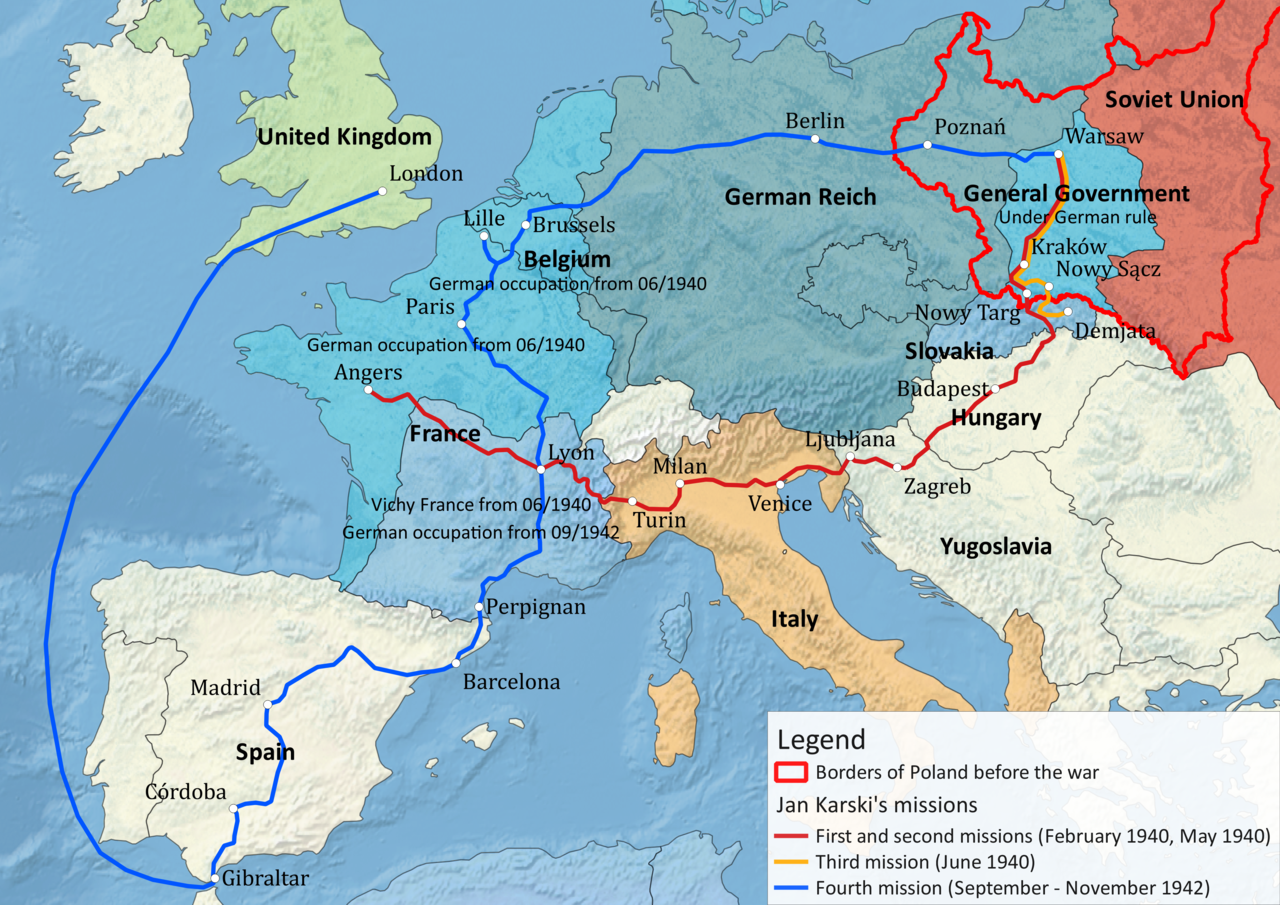 In November 1939 on a train to a POW camp in General Government (a part of Poland which had not been fully incorporated into The Third Reich), Karski managed to escape, and found his way to Warsaw. There he joined the SZP (Sluzba Zwyciestwu Polski) – the first resistance movement in occupied Europe organized by General Michal Karaszewicz-Tokarzewski and a predecessor of ZWZ, later the Home Army (AK). About that time he adopted a nom de guerre of Jan Karski, which later became his legal name. Other noms de guerre used by him during World War II included Piasecki, Kwasniewski, Znamierowski, Kruszewski, Kucharski, and Witold. In January 1940 Karski began to organize courier missions with dispatches from the Polish underground to the Polish Government in Exile, then based in Paris. As a courier, Karski made several secret trips between France, Britain and Poland. During one such mission in July 1940 he was arrested by the Gestapo in the Tatra Mountains in Slovakia. Severely tortured, he was finally transported to a hospital in Nowy Sacz, from which he was smuggled out with vital help of Józef Cyrankiewicz. After a short period of rehabilitation, he returned to active service in the Information and Propaganda Bureau of the Headquarters of the Polish Home Army.
In November 1939 on a train to a POW camp in General Government (a part of Poland which had not been fully incorporated into The Third Reich), Karski managed to escape, and found his way to Warsaw. There he joined the SZP (Sluzba Zwyciestwu Polski) – the first resistance movement in occupied Europe organized by General Michal Karaszewicz-Tokarzewski and a predecessor of ZWZ, later the Home Army (AK). About that time he adopted a nom de guerre of Jan Karski, which later became his legal name. Other noms de guerre used by him during World War II included Piasecki, Kwasniewski, Znamierowski, Kruszewski, Kucharski, and Witold. In January 1940 Karski began to organize courier missions with dispatches from the Polish underground to the Polish Government in Exile, then based in Paris. As a courier, Karski made several secret trips between France, Britain and Poland. During one such mission in July 1940 he was arrested by the Gestapo in the Tatra Mountains in Slovakia. Severely tortured, he was finally transported to a hospital in Nowy Sacz, from which he was smuggled out with vital help of Józef Cyrankiewicz. After a short period of rehabilitation, he returned to active service in the Information and Propaganda Bureau of the Headquarters of the Polish Home Army.
In 1942 Karski was selected by Cyryl Ratajski, the Polish Government Delegate's Office at Home, to perform a secret mission to prime minister Wladyslaw Sikorski in London. Karski was to contact Sikorski as well as various other Polish politicians and inform them about Nazi atrocities in occupied Poland. In order to gather evidence, Karski met Bund activist Leon Feiner and was twice smuggled by Jewish underground leaders into the Warsaw Ghetto for the purpose of directly observing what was happening to Polish Jews. Also, disguised as an Estonian camp guard, he visited what he thought was Belzec death camp. In actuality, it seems that Karski only managed to get close enough to witness a Durchgangslager (transit camp) for Belzec in the town of Izbica Lubelska, located midway between Lublin and Belzec. Many historians have accepted this theory, as did Karski himself.
Reporting Nazi atrocities to the Western Allies
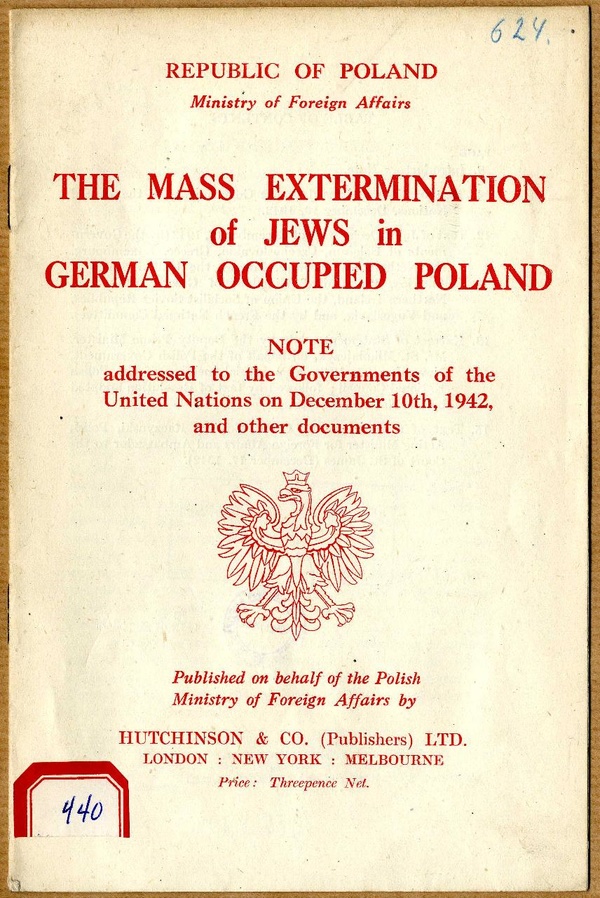 Starting in 1942, Karski reported to the Polish, British and U.S. governments on the situation in Poland, especially on the destruction of the Warsaw Ghetto and the Holocaust of Polish Jews. He had also carried out of Poland a microfilm with further information from the underground movement on the extermination of European Jews in German-occupied Poland. The Polish Foreign Minister Count Edward Raczynski provided the Allies on this basis one of the earliest and most accurate accounts of the Holocaust. A note by Raczynski entitled The mass extermination of Jews in German occupied Poland, addressed to the governments of the United Nations on 10 December 1942, would later be published along with other documents in a widely distributed leaflet. The cover of this document is pictured at right and links to the entire document in pdf format.
Starting in 1942, Karski reported to the Polish, British and U.S. governments on the situation in Poland, especially on the destruction of the Warsaw Ghetto and the Holocaust of Polish Jews. He had also carried out of Poland a microfilm with further information from the underground movement on the extermination of European Jews in German-occupied Poland. The Polish Foreign Minister Count Edward Raczynski provided the Allies on this basis one of the earliest and most accurate accounts of the Holocaust. A note by Raczynski entitled The mass extermination of Jews in German occupied Poland, addressed to the governments of the United Nations on 10 December 1942, would later be published along with other documents in a widely distributed leaflet. The cover of this document is pictured at right and links to the entire document in pdf format.
Karski met with Polish politicians in exile including the Prime Minister, as well as members of political parties such as the Socialist Party, National Party, Labor Party, People's Party, Jewish Bund and Poalei Zion. He also spoke to the British Foreign Secretary Anthony Eden, giving a detailed statement on what he had seen in Warsaw and Belzec. In 1943 in London he met journalist Arthur Koestler, author of Darkness at Noon. He then traveled to the United States, and on 28 July 1943 Karski personally met with President Franklin D. Roosevelt in the Oval Office, telling him about the situation in Poland and becoming the first eyewitness to tell him about the Jewish Holocaust. During their meeting, Roosevelt asked about the condition of horses in Poland. Roosevelt did not ask one question about the Jews. Karski went on to meet with many other government and civic leaders in the United States, including Supreme Court Justice Felix Frankfurter, Cordell Hull, William Joseph Donovan, and Rabbi Stephen Wise. Frankfurter, skeptical of Karski's report, said later "I did not say that he was lying, I said that I could not believe him. There is a difference." Karski presented his report to media, bishops of various denominations (including Cardinal Samuel Stritch), members of the Hollywood film industry and artists, but without much result. His warning about the Yalta solution and the plight of stateless peoples became an inspiration for the formation of the Office of High Commissioner for Refugees after the war.
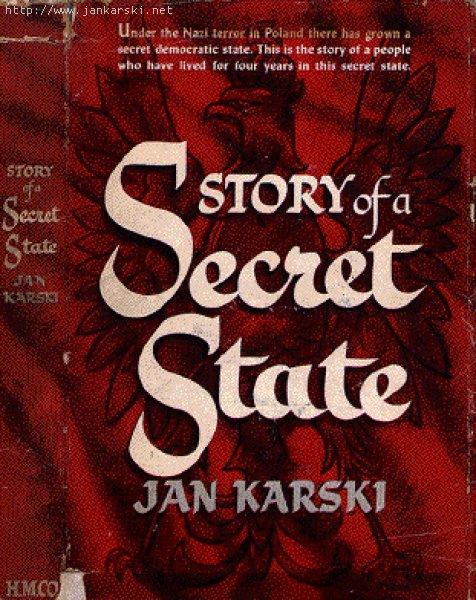
In 1944, Karski published Courier from Poland: The Story of a Secret State (with a selection featured in Collier's six weeks before the book's publication), in which he related his experiences in wartime Poland. The book was a major success (a film of it was planned but never realized) with more than 400,000 copies sold up to the end of World War II.
My Report to the World: The Story of a Secret State was re-published by Georgetown University Press and released on 18 March 2013. A Tribute to Jan Karski panel discussion was held at the University in conjunction with the book release, and featured a discussion of Karski's legacy by School of Foreign Service Dean Carol Lancaster, Georgetown University Chair of the board of directors Paul Tagliabue, Former Secretary of State Madeleine Albright, Former National Security Advisor Zbigniew Brzezinski, Polish Ambassador Ryszard Schnepf and Rabbi Harold S. White.
Life in the United States
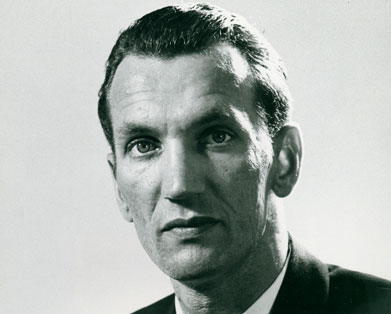 After the war ended, Karski remained in the United States and began his studies at Georgetown University, receiving a PhD from the institution in 1952. In 1954, Karski became a naturalized citizen of the United States. He taught at Georgetown University for 40 years in the areas of East European affairs, comparative government and international affairs. Among his students was Bill Clinton (Class of 1968). In 1985, he published the academic study The Great Powers and Poland based on research on a Fulbright fellowship in 1974 to his native Poland.
After the war ended, Karski remained in the United States and began his studies at Georgetown University, receiving a PhD from the institution in 1952. In 1954, Karski became a naturalized citizen of the United States. He taught at Georgetown University for 40 years in the areas of East European affairs, comparative government and international affairs. Among his students was Bill Clinton (Class of 1968). In 1985, he published the academic study The Great Powers and Poland based on research on a Fulbright fellowship in 1974 to his native Poland.
Karski's 1942 report on the Holocaust and the London Polish government's appeal to the United Nations were briefly narrated by Walter Laqueur in "The Terrible Secret" (1980). Karski became a public figure thanks to Elie Wiesel who made him a keynote speaker at the Concentration Camps Liberators Conference (1981) and French film-maker Claude Lanzmann for Lanzmann's film Shoah made with Karski's testimony. The film was released in 1985 and included parts of the first day of a 2-day interview Lanzman had had with Karski (only 40 minutes of the almost 9 hours of interview time.) The segment ends with Karski stating he made his report. On the second day of interviews, as Lanzman recalls, he met with a very different Karski, who recounted in precise details his meeting with Roosevelt and other high officials, notably Justice Frankfurter who, Karski recalls, did not believe him. According to Lanzman, the tone and style of the second day of interviews was so different, and the interview so long, that it would not fit into Lanzman's vision. The missing segment was released separately in 2010, possibly in response to a controversy following the release of a novel on Karski's World War II activities. Earlier, in their book on Karski, Wood and Jankowski state that Karski wrote a book and article (which was published in English, French and Polish) called "Shoah, a Biased Vision of the Holocaust", in which he pleaded for the production of another documentary showing the missing part of his testimony and the help given to Jews by Polish Righteous among the Nations. Jan Karski with General Colin Powell at the opening of the United States Holocaust Memorial Museum
In 1994, E. Thomas Wood and Stanislaw M. Jankowski published Karski: How One Man Tried to Stop the Holocaust. In 2010, Lanzmann released a further documentary entitled The Karski Report consisting of the previously unreleased second half of his interview with Karski. In 1997, the documentary film My Mission directed by Waldemar Piasecki and Michal Fajbusiewicz was released, presenting as never before all details of Karski's war mission. In 1999, Tajne Panstwo book (Polish, re-edited and re-wrote by Waldemar Piascecki version of Story of A Secret State) got its premiere in King's Place in Warsaw and became a bestseller. In the same year, Jan Karski's Room was opened in the Museum of Lodz City. The exposition grouped the most valuable memorabilia, documents and decorations organized under Karski's supervision.
Following the fall of communism in Poland in 1989, Karski's wartime role was officially acknowledged there. He received the Order of the White Eagle (the highest Polish civil decoration) and the Order Virtuti Militari (the highest military decoration awarded for bravery in combat). He was married in 1965 to the 54-year-old dancer and choreographer Pola Nirenska, a Polish Jew, whose family (with the exception of her parents, who emigrated to Israel shortly before the Nazi invasion of Poland), died in the Holocaust. She committed suicide in 1992. A similar fate met Jan Karski's older brother Colonel Marian Kozielewski, also a war hero. The Kozielewski brothers were admirers of Jozef Pilsudski and members of the "forgotten army" that suffered many deeply personal wounds.
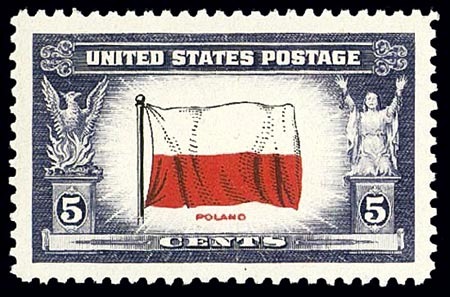
US stamp from 1943, a tribute to Polish Underground State
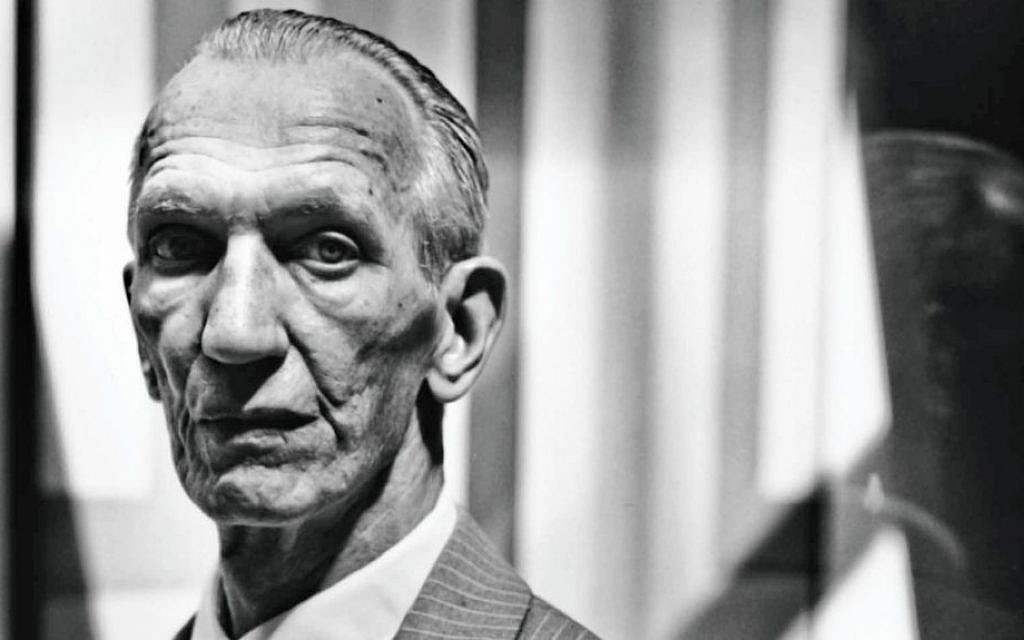
During an interview with Hannah Rosen in 1995,
Karski said about the failure to rescue most of the Jews from mass murder:
It was easy for the Nazis to kill Jews, because they did it. The Allies considered it impossible and too costly to rescue the Jews, because they didn't do it. The Jews were abandoned by all governments, church hierarchies and societies, but thousands of Jews survived because thousands of individuals in Poland, France, Belgium, Denmark, Holland helped to save Jews. Now, every government and church says, "We tried to help the Jews", because they are ashamed, they want to keep their reputations. They didn't help, because six million Jews perished, but those in the government, in the churches they survived. No one did enough.
Karski died of unspecified heart and kidney disease in Washington, D.C., in 2000. He died at Georgetown University Hospital. He was interred at Mount Olivet Cemetery in Washington, next to the graves of his wife and brother. He and Pola had no children.
Awards, Honors and Legacy
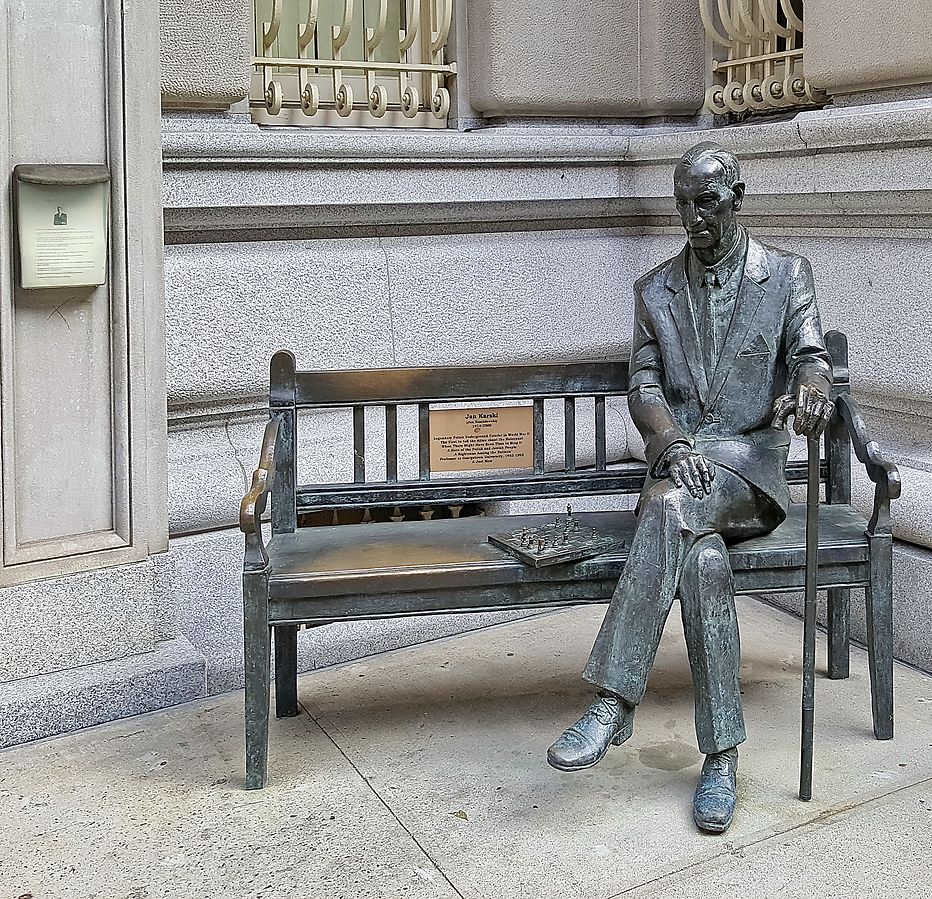 Jan Karski Statue in Tel Aviv University
Jan Karski Statue in Tel Aviv UniversityJan Karski's Bench in front of the Consulate General of the Republic of Poland in New York City.
A mural, "He Who Does Not Condemn Acquiesces", commemorating Karski at 30/32 Lubelska Street in Warsaw.
On 2 June 1982, Yad Vashem recognised Jan Karski as Righteous Among the Nations. A tree bearing a memorial plaque in his name was planted that same year at Yad Vashem's Avenue of the Righteous Among the Nations in Jerusalem.
In 1991, Karski was awarded the Wallenberg Medal of the University of Michigan. Statues honoring Karski have been placed in New York City at the corner of 37th Street and Madison Avenue (renamed as Jan Karski Corner) and on the grounds of Georgetown University in Washington, D.C. Additional benches, which were made by the Kraków-based sculptor Karol Badyna, are located in Kielce, Lódz and Warsaw in Poland, and on campus of the Tel Aviv University in Israel. The talking Karski bench in Warsaw near the Museum of the History of Polish Jews has a button where a short talk from Karski can be heard. Georgetown University, Oregon State University, Baltimore Hebrew College, Warsaw University, Maria Curie-Sklodowska University, and the University of Lódz all awarded Karski honorary doctorates.
In 1994, Karski was made an honorary citizen of Israel in honor of his efforts on behalf of Polish Jews during the Holocaust (Shoah). Karski was nominated for the Nobel Prize and formally recognized by the UN General Assembly shortly before his death.
Shortly after his death, the Jan Karski Society was established, thanks to initiative of professor Karski's close friend, collaborator and biographer Waldemar Piasecki. The society preserves his legacy and administrates the prestigious Jan Karski Eagle Award established by himself in 2000. The list of laureates includes among them: Elie Wiesel, Shimon Peres, Lech Walesa, Aleksander Kwasniewski, Tadeusz Mazowiecki, Bronislaw Geremek, Jacek Kuron, Adam Michnik, Karol Modzelewski, Oriana Fallaci, Dagoberto Valdés Hernández, Cardinal Stanislaw Dziwisz, Tygodnik Powszechny magazine, Hoover Institution, United States Holocaust Memorial Museum.
In April 2011, the Jan Karski U.S. Centennial Campaign was created to increase interest in the life and legacy of the late Polish diplomat, as the Centennial year of his birth in 2014 approached. The U.S. Campaign, headed by Polish-American author Wanda Urbanska, worked in partnership with the International Legacy program at the Polish History Museum in Warsaw, Poland, under the direction of Ewa Wierzynska. Polish Consul General Ewa Junczyk-Ziomecka hosted a gala kickoff dinner in New York City on 30 May, consisting of representatives from Georgetown University, Polish Catholic and Jewish groups which comprised the steering committee. Grave of Jan Karski and Pola Nirenska at Mount Olivet Cemetery in Washington, D.C.
One goal of the Campaign group was to obtain the Presidential Medal of Freedom for Karski in advance of his Centennial, as well as to promote educational activities, including workshops, artistic performances and the revival of his 1944 book, Story of a Secret State. In December 2011, the support of 68 U.S. Representatives and 12 U.S. Senators was obtained and a package for the Medal was submitted to the White House. On 23 April 2012, U.S. President Barack Obama announced that Karski would receive the country's highest civilian honor, the Presidential Medal of Freedom. The Medal was awarded by President Obama on 29 May 2012 and presented to Adam Daniel Rotfeld, the former Foreign Minister of Poland and himself a Jewish Holocaust survivor. Jan Karski's family was omitted during the decoration procedure and not invited for the presentation ceremony. Such a fact generated strong family protest. The medal, along with Jan Karski's honors, is on display at "the Karski office" in Lódz Museum according to the wishes of his surviving family led by his niece and goddaughter Dr. Kozielewska-Trzaska.
In November 2012, having met its major goals, the Jan Karski U.S. Centennial Campaign was succeeded by the Jan Karski Educational Foundation, which continues to promote Karski's legacy and values, particularly to young people from middle school through college age. The President of the Foundation is Polish-American author Wanda Urbanska. The Foundation sponsored three major conferences about Karski in his centennial birth year, at Georgetown University in Washington, at Loyola University in Chicago, and in Warsaw.
A controversy began when a misspoken word in Barack Obama's Presidential Medal of Freedom speech came to be known as "Gafa Obamy" or Obama's gaffe, when the President referred to "a Polish death camp" (instead of "death camp in Poland") when talking of the Nazi German transit death camp that Karski had visited. "Polish death camps" is a term often used to refer to Nazi concentration camps in Poland, as opposed to (as may be implied) Polish concentration camps. The terms "Polish death camp" or "Polish concentration camp" were reportedly promulgated by ex-Nazis working for the West German secret services. Historian Leszek Pietrzak explains the propaganda strategies from the 1950s. President Obama later characterized his term as a mis-statement and it was accepted by Polish President Bronislaw Komorowski.
On 24 June 2014, the "Jan Karski. Mission Accomplished" Conference took place in Lublin under the patronage of Professor Elie Wiesel, Nobel Peace Prize Laureate, Aleksander Kwasniewski, President of Poland (1995–2005), Moshe Kantor, President of the European Jewish Congress, and Michael Schudrich, Chief Rabbi of Polan
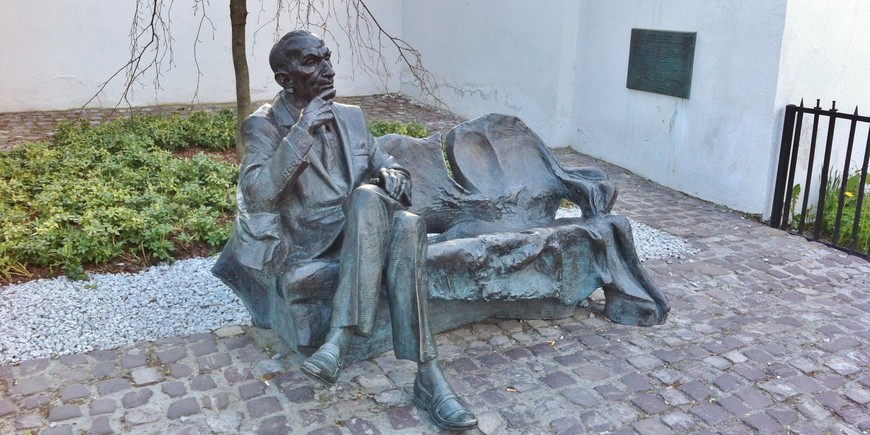
The monument in Kraków was installed in 2016 and takes the form of a bench,
emulating similar Karski benches in Lódz, Warsaw, Kielce and Tel Aviv.
Watch Jan Karski on You Tube
Jan Karski about his meeting with President Franklin D. Roosevelt, 1943
Holocaust Rescue and Aid Provider Jan Karski Testimony
Jan Karski - The Messenger
Jan Karski about his meeting with Szmul Zygielbojm, 1942
Jan Karski about his meeting with Supreme Court Justice Felix Frankfurter, 1943
Other Links to Jan Karski
Hoover Institution and Jan Karski Search Results
